Dr. Kelly Starrett and Juliet Starrett Help You Get Ready for Anything Life Throws You
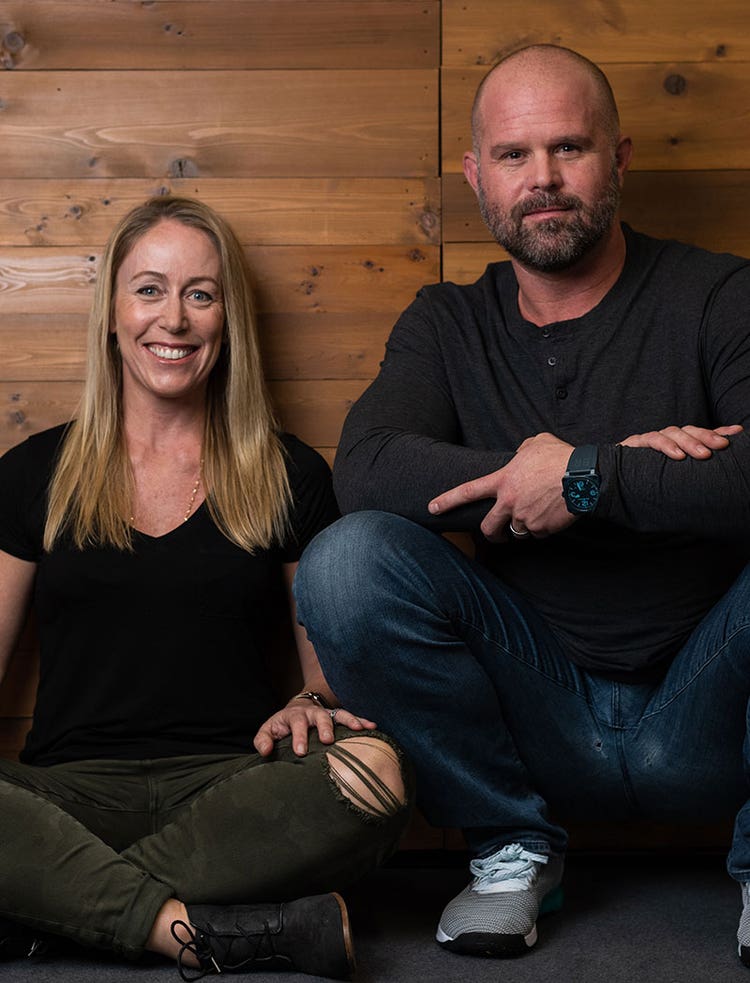
Dr. Kelly Starrett and Juliet Starrett have spent the last decade on the leading edge of movement, mobility and recovery. They began their work in 2008 as the MobilityWOD and worked with Olympic gold medalists, UFC champions and dozens of other pro sports organizations, fitness professionals and fitness enthusiasts worldwide.
Their work revolutionized how athletes think about human movement and athletic performance—but their passion always has been for helping athletes, including everyday athletes, be ready for the game of life—ready for the next race, the next workout, running around with family and kids, ready for anything life throws their way.
With this mantra, they launched The Ready State in 2019, and they’re on a mission to educate and empower professionals and enthusiasts everywhere. They met with 24Life Editor-in-Chief Lashaun Dale again to share their insights and give a peek into their daily routines as working parents who have to get creative and stay compassionate as they work on their own fitness and wellness.
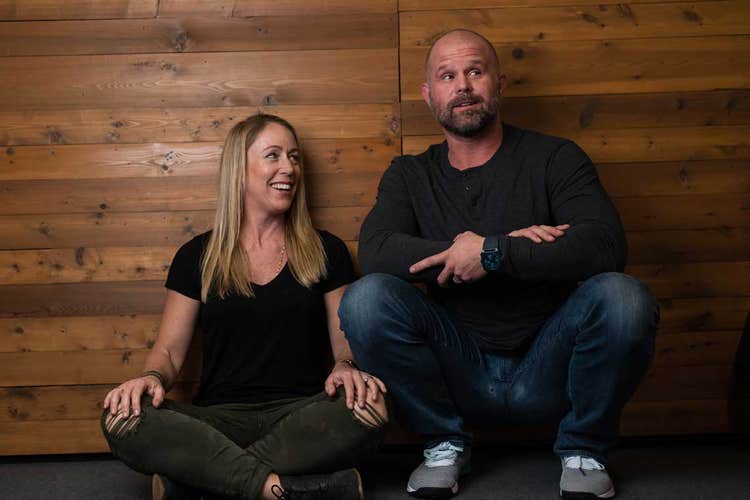
Lashaun Dale: How does The Ready State carry on the work from the MobilityWOD?
The Starretts: Improving mobility and range of motion will always be at the heart of what we do at The Ready State. As we like to say, your body is a complex “system of systems,” and that means a conversation about recovery that only focuses on mobility is incomplete. By becoming The Ready State, we now can have a more complete discussion of sleep, downregulation, nutrition and more.
From well over a decade of experience working across platforms and organizations, we had an opportunity to pivot, helping people understand not just how to perform but also how to take care of their bodies. Our work with elite athletes serves as the proving grounds for our methods. If our methods help athletes at the highest levels, then they can work for anyone. It allows us to stress-test our thinking and understand what works and what doesn’t work so that we can apply it to the rest of us, including my wife, myself and our children.
There is a misconception that this is something that athletes do and I’m not an athlete, that’s not for me. What we really want to do with the content that we serve up is to help people be ready for whatever it is that they need and experience in their life. We want to create a platform that is welcoming to all types of people.
LD: What do you mean by The Ready State?
The Ready State was a concept born even before we started making video content. It acknowledges the unrealistic idea that if we could control 500 different variables and eat perfect foods and do the perfect exercise, we will feel perfectly.
The reality is that you’re going to have babies and travel for work, or maybe you played high- school soccer and sprained your ankle and can’t train today. Know that your best self is the self that can manage as many of the variables as you can, today. The heart of The Ready State is to meet you where you are and to honor whatever is important to you, whether that is getting out of pain or improving your squats or setting a world record. There is a way to control and manage the variables of your life so that you can feel better.

LD: What does it take to get Ready?
Our mission is to help you Live Ready. We have been conditioned to think about our fitness and our wellness and health as a short game. Your health and wellness is what we call an “infinite game” and you can’t ever win, but what you can do is play better day to day.
LD: This sounds like more work. How do we fit it in to a busy life?
We all get a 24-hour cycle. What do we do with it? When we start to think about physical practice, it’s not just about exercise. It’s about the relationships that I have, the relationship with myself, the level of stress that I carry around, how much non-exercise activity I did during the day. Did I eat whole foods? Did I get enough sleep?
Another core Ready State principle is that human beings should be able to perform basic maintenance on themselves. With the right approach, people can resolve many of their aches and pains on their own—even if they’ve lingered for a long time. It’s much more sexy to work on some new AB split or yoga pose or cardio routine. But daily practices create real readiness and stability in human function.
LD: So The Ready State is also a shift in mindset?
Yes, from thinking that your fitness, health and wellness are more things you have to do to creating a structure to your life where these things naturally fit in. That may mean not sitting so much and standing up more, taking the stairs, or realizing that if you got into bed a half-hour earlier every night, in two weeks, you would sleep a whole extra night. When we begin to think about and implement the basics, we see fundamental changes in body composition, alertness and energy, and that leads to conversations about exercise and learning new skills or playing games.
It also means if you normally drag yourself to the gym but one night you miss it, and then when you get home, you don’t have an ideal blend of macros to eat and your sleep was truncated, that you know that it is not a failure.
As those behaviors aggregate over months and years and decades, we end up creating a resilient person who is useful to their community, feels better and can get more work done.

LD: Is there actually a physical state that we should aspire to?
People don’t even know that they are missing their physical capacity. They want to be a Spartan athlete, and they cannot [imagine their] success because they started and suddenly discover they are missing the physical capacity, so they think, I must not be one of the lucky ones or one of the chosen ones, and they quit.
One of the things that we try to do is establish movement “vital signs.” What does it mean for me to be at full physical capacity? The goal is that my mechanics and my ability to move freely both build and continue to improve. This is all within my control, even if it is a moving target based on my lifestyle of jumping on an airplane, being brutally sore after a long ride or having to sit all day in meetings.
Many of us don’t realize how low that bar has been set in terms of our basic positioning. It can be a shock when we can’t do something all of a sudden and we come to understand that we should be able to move that way.
LD: How did we get here?
It’s just an expression of our environment. We tell our children to play outside and be as active as they can. Then they hit grade school and we tell them to stop wiggling and to sit tight.
We are designed to move. We have—for better or worse—created environments where we’re not exposed to a lot of movement, and over time, our bodies lose that range of motion. Let’s focus on restoring and maintaining the range of motion that keeps us mobile.
As you age, you’re never going to be able to run your engine as hard as you needed when you were young, and guaranteed you’re going to lose the muscle mass. But you can always maintain your range of motion. We need to help people realize that it is important to maintain mobility and health because it’s a lot harder to regain it than it is to keep it up. The Ready State assessment evaluates some basic movement shapes and identifies any blind spots.
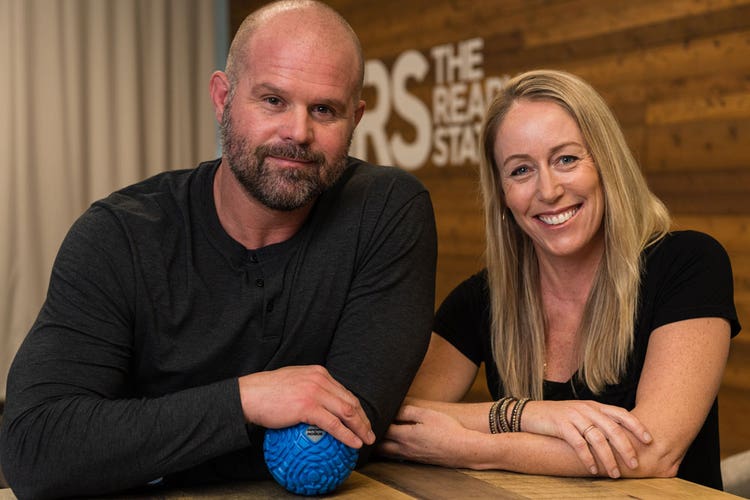
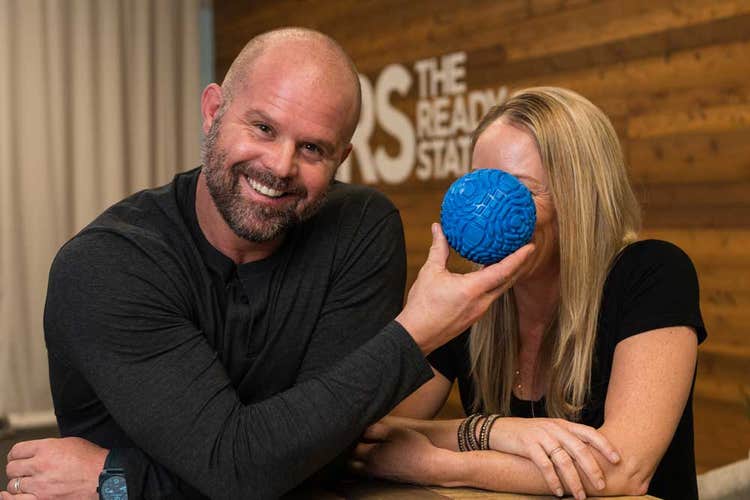
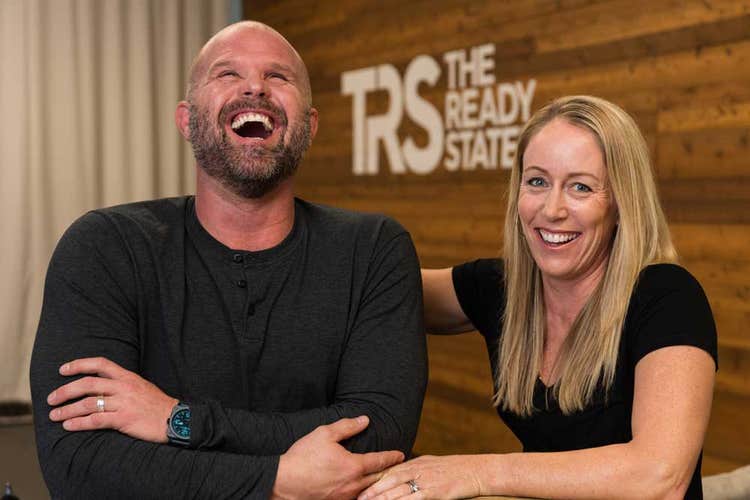
LD: Where do we start?
Let’s start with range-of-motion minimums, like putting your arms over your head, reaching behind your back to do your bra or squatting all the way to the ground.
Those range-of-motion minimums create a body that is under less stress, is more resilient and that has more options.
We are on a mission to give people the tools to make themselves feel better or to take care of their family members so that we don’t feel flummoxed when our daughter comes home and says her knee hurts after water polo practice. We don’t want you to go to the gym and lie on a foam roller. We want you to go to the gym and train and play and exercise and breathe hard. You can take care of moving around by squatting in front of the TV when you get home. In the last 15 minutes before you go to bed, there’s still an opportunity for you to make yourself feel better. People wait until they have either a nagging pain or some kind of catastrophic injury, and all of a sudden, they’re facing a [crisis to] start taking care of their body.
What we realize is that it’s no one’s fault. We’re just expressions of the system and people are in pain. It doesn’t matter how rich your family is or what state you live in, we’re staring at big statistics around the fact that there’s something going on with the environment that isn’t conducive to thriving as a human being.
So ultimately what we’re trying to do is teach people how to take care of their bodies so that they feel happy and healthy and share sensible ideas with their families.
LD: How does life change when you Live Ready?
This is a core Ready State principle. It’s impossible to reach your full potential if you’re in pain, stiff or tight. Yes, maintaining your body helps you play sports and exercise better, but your physical health also impacts your daily mental and emotional health. So getting in The Ready State also can help you be a better leader, employee, executive or entrepreneur.
The body is an integrated system. For example, if you move more during the day, you’ll accumulate enough exercise to feel tired in the evening, and when you roll around on a ball for 10 minutes before you go to bed, you’ll trigger a huge downregulatory effect and fall asleep sooner, sleep deeper and wake up more refreshed. When you change your breathing pattern, [it] directly impacts how your brain is perceiving your stress level. If we want to have better cognitive function, we’ve got to move more, and the research is clear on this, from kids to adults.
Our experience over the last 15 years is that you have the power to make yourself feel better, improve your body’s amazing physical capacities and improve your output. Knowing how to take care of yourself is one of the things that makes us human beings.
Ready to Experience The Ready State?
Check out how Dr. Kelly Starrett and Juliet Starrett define mobility.
https://www.youtube.com/watch?v=mF820Pigq8s
Try Dr. Kelly Starrett’s morning routine.
https://www.youtube.com/watch?v=NfdBJLlIVVI
Try Dr. Kelly Starrett’s anytime breath practice.
Get to Know the Starretts
First thing you do when you wake up?
Kelly Starrett: I make espresso, check for fires on email and social media, then chug a big glass of salted lemon water.
Juliet Starrett: Drink coffee!
Last thing you do before sleep?
KS: I like to read a little bit from an actual book. Make the room black, then put on my eye mask.
JS: Read!
Top travel tip?
KS: Walk as much as possible. You need to move after long plane trips. And you will actually make yourself tired enough to be excited to fall asleep in a strange bed and time zone.
JS: Fast before, during and after your flight. Airport and airplane food is all bad, and it’s a perfect time to fast.
Last book you read?
KS: “The Man Watching,” the biography of Anson Dorrance, head coach of the University of North Carolina’s women’s soccer team.
JS: “What You Do Is Who You Are,” by Ben Horowitz.
What is your strength?
KS: I have a knack for seeing patterns and relationships. But my secret strength is being married to Juliet.
JS: Resilience.
Superpower you would like to have?
KS: My wife’s organizational brain. I’m just not wired that way.
JS: I wish I was as comfortable in front of a camera as Kelly!
How do you handle stress and overwhelm in the moment?
KS: I’m pretty good at dissociating from stress. I learned this skill as a kid, ski racing and paddling scary rivers. I’m actually a little better with pressure like many people. I never sleep well the night before a big effort or event.
JS: Preparation and focus.
Workout you would do in 24 minutes or less?
KS: My go-to every couple of weeks is to deadlift 315 pounds every 30 seconds for 20 to 30 minutes—but 24 minutes seems to be the sweet spot.
JS: My favorite workout is called a “tick,”—every minute on the minute, alternating a one-minute all-out sprint on the bike and five front squats.
What’s your message to the world?
KS: Be consistent before being heroic! You got this.
JS: Focus on the basics and ignore all the chatter: Eat some vegetables, prioritize sleep, get some exercise (preferably something you enjoy), walk a lot, drink some water and take care of your body by mobilizing.
Video & photo credit: Mark Kuroda, kurodastudios.com